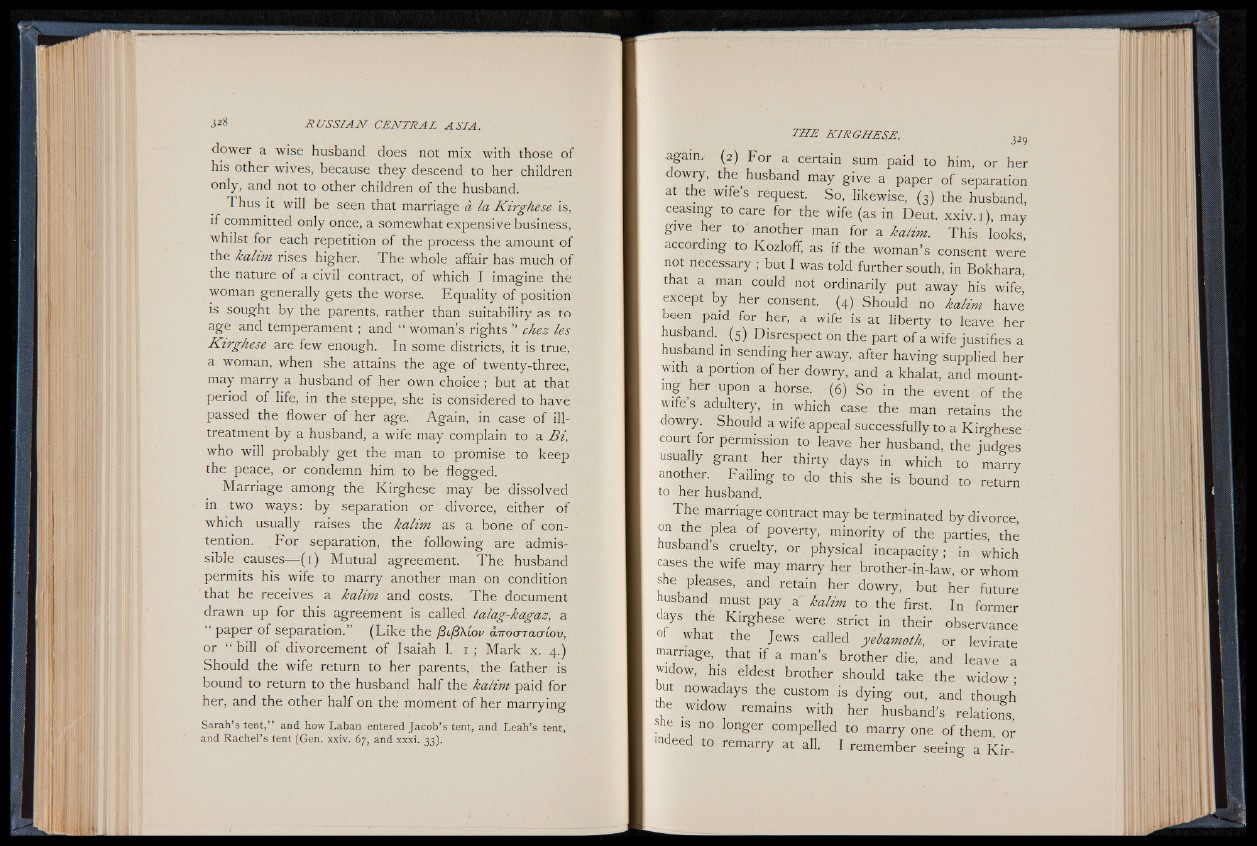
dower a wise husband does not mix with those of
his other wives, because they descend to her children
only, and not to other children of the husband.
Thus it will be seen that marriage d la Kirghese is,
if committed only once, a somewhat expensive business,
whilst for each repetition of the process the amount of
the kalim rises higher. The whole affair has much of
the nature of a civil contract, of which I imagine the
woman generally gets the worse. Equality of position
is sought by the parents, rather than suitability as to
age and temperament; and “ woman’s rights ” chez les
Kirghese are few enough. In some districts, it is true,
a woman, when she attains the age of twenty-three,
may marry a husband of her own choice; but at that
period of life, in the steppe, she is considered to have
passed the flower of her age. Again, in case of ill-
treatment by a husband, a wife may complain to a B i,
who will probably get the man to promise to keep
the peace, or condemn him to be flogged.
Marriage among the Kirghese may be dissolved
in two ways: by separation or divorce, either of
which usually raises the kalim as a bone of contention.
For separation, the following are admissible
causes— (i) Mutual agreement. The husband
permits his wife to marry another man on condition
that he receives a kalim and costs. The document
drawn up for this agreement is called talag-kagaz, a
“ paper of separation.” (Like the yStySXto^ ¿LTrocrTacriov,
or “ bill of divorcement of Isaiah 1. i ; Mark x. 4.)
Should the wife return to her parents, the father is
bound to return to the husband half the kalim paid for
her, and the other half on the moment of her marrying
Sarah’s tent,” and how Laban entered Jacob’s tent, and Leah’s tent,
and Rachel’s tent (Gen. xxiv. 67, and xxxi. 33).
again. (2) For a certain sum paid to him, or her
dowry, the husband may give a paper of separation
at the wife’s request. So, likewise, (3) the husband,
ceasing to care for the wife (as in Deut. xxiv.i), may
give her to another man for a kalim. This looks
according to Kozloff, as if the woman’ s consent were
not necessary ; but I was told further south, in Bokhara,
that a man could not ordinarily put away his wife,
except by her consent. (4) Should no kalim have
been paid for her, a wife is at liberty to leave her
husband. ^ (5) Disrespect on the part of a wife justifies a
husband in sending her away, after having supplied her
with a portion of her dowry, and a khalat, and mounting
her upon a horse. (6) So in the event of the
wifes adultery, in which case the man retains the
dowry. Should a wife appeal successfully to a Kirghese
court for permission to leave her husband, the judges
usually grant her thirty days in which to marry
another. Failing to do this she is bound to return
to her husband.
The marriage contract may be terminated by divorce,
on the plea of poverty, minority of the parties, thè
husband’s cruelty, or physical incapacity; in which
cases the wife may marry her brother-in-law, or whom
she pleases, and retain her dowry, but her future
husband must pay a kalim to the first. In former
days the Kirghese were strict in their observance
0 what the ^ Jews called yebamoth, or levirate
marriage, that if a man’s brother die, and leave a
widow, his eldest brother should take the widow;
_ut nowadays the custom is dying out, and though
the widow remains with her husband’s relations,
she is no longer compelled to marry one of them, or
>n eed to remarry at all. I remember seeing a Kir